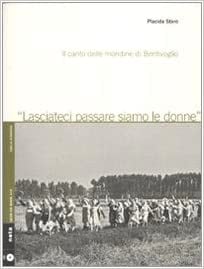Article index
Li Montine: a memory and a reflection on exploitation starting from the story about a working song.
 8
8
March International Day of Women's Rights. A day when I think time has slowly transformed its purpose. A certain mimosa, a celebration, but when to reflect or raise public awareness for example with silence? Too many words, too many anniversaries, still today the woman lives subjugated, exploited, perhaps in a different way, but still submissive.
ENOUGH!
In this article I would like to remind you that until the middle of the twentieth century Monda's work was still present, a life in my opinion surreal, massacred, which in some ways bordered the slavery. Well after this outburst, which I feel inside my daily life, we move on to the importance of singing used by milestones as a tool of "salvation" and "union" within their daily work.
The marshads and their singing, in order to survive exploitation
The marshes were the women who worked in the rice fields, whose task was to clean the rice and snatch the Javenian, a very hard and harmful grass for the growth of rice.
The hours of work were many, from dawn to sunset, the moments of dialogue were interspersed with numerous songs, stories that narrated the labors of the work and daily life of that time, to simple songs that "painted" the few happy moments. The transmission of these songs was handed down orally, from the older working women to the youngest, just in the moments of the "Monda" or in the small moments of leisure that tended to be at the end of the day.
Today, when I pass with my car in the Terre del Vercellese, heading to my parents' house, I always imagine the figures of these women intent on working, and how they have done to endure many labors and humiliations. Underpaid, forced to work in bad condition and to submit to the will of the supervisors or to the head of the foreman to earn a miserable wage. Reflecting I must admit that perhaps instead of celebrating we should seek values such as respect for the work, freedom and protection of the human being. I would like to report this book written by Placida Staro entitled: for fans of popular singing entitled:
 “Let us pass we are women. The singing of Bentivoglio's milestones "
“Let us pass we are women. The singing of Bentivoglio's milestones "
I report below Abstract to understand the beauty of this book:
“The singing repertoires superficially represent, in the collective imagination, the distant memory of an original musical tradition. Instead, they are a mirror of a cultural and social reality not even so far away if the group of marshades of the Benivoglio, in the province of Bologna, still boasts its right to continue to transmit, far from the stereotypes of the revival of manner, not only the singing, but the Complexity of a culture that, albeit painstakingly, wants to survive and hand out.
The book and the audio CD edited by Placida Staro report, through the recording of a live evening, the attempt to reflect on the stylistic and communication methods of the choral song to the expanse of the Bolognese plain.
A song that the same protagonists define screamed to underline the implications of social and political antagonism that have, among other things, made the protagonist of the seasons of the political singing of the period 1960-1980. "
Read also the article: Konnakol vocal practice from India






